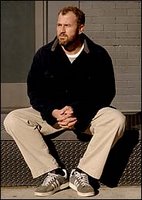
james frey has recently been questioned about the authenticity of his memoir, A Million Little Pieces. in short, Pieces chronicles mr. frey's descent into and recovery from serious alcohol and drug addiciton. (book press descibed it as "Frey's kamikaze run of self-destruction.")
gathering criticism has seriously stained Pieces. in fact, thesmokinggun.com presents specific legal documents that clearly contradict mr. frey's written account. they maintain that frey baldly lies about his personal experiences. for example, the memoir explains that frey spent three months in an ohio jail for running over a curb and into a police officer. however, thesmokinggun.com details that frey simply jumped the curb, didn't hit anybody or anything, and was held without restraints for hours in a holding cell.
a slate.com analysis also questions his bonafides as a recovering addict. slate maintains that addicts often embellish shady memories to earn street credentials. addicts, they're saying, wear super strong memories like a small man might wear a superhero suit with blown up muscles. further, slate explains that mr. frey shopped Pieces to several publishers as fiction. after publishers refused the fiction manuscript as stale, his agent re-presented the work as personal memoir.
the critics present serious evidence to question mr. frey and his memoir. however, is mr. frey wrong? what is memoir?
memoir is popularly defined as "an account of the personal experiences of an author" and "a biography or biographical sketch". contemporary authors and publishers generally believe the first definition of memoir is most accurate. here, memoir is distinct from biography. it is not a clear, dry report of life and life experience. rather, memoir is "creative nonfiction". it is poetry. it shapes and threads personal memories and reflections to present a larger, truer story. "truer", here, is like my writing teacher explained: "there is a truth that is more true than the truth."
A Million Little Pieces was selected for oprah winfrey's book club, last fall. certainly, the increased exposure has led to increased accountability. however, ms. winfrey supports mr. frey's princple rationale that the memoir presents the "essential truth" of his addiction and recovery. mr. frey also joined larry king live on wednesday evening to answer the criticism. in part, he explained that the events in question total only 12 pages of a 448 page book.
however, i am not sure i accept mr. frey's anti-scientific, pseudo-intellectual explanation that page numbers and percentages are trumped by truth. i do believe that writers should have limited creative license in memoir. we cannot understand ourselves without reflection. and, our reflection includes our filters and lenses. we cannot always remember conversations, events, or news exactly and specifically. authors should be able to shape conversation or memories in non-essential ways. but, i also believe that readers must be able to assume that the basic context of specific events in memoir are accurate, not just "true".
it is okay for mr. frey to shape his experience and reflection. he is the author and owner of his ideas and his feelings. however, it is not okay for mr. frey to change his experience from 3 hours in jail to 3 months in memoir. this creates a wholly new and untrue experience. it requires creativity and imagination that is accurate and true in fiction. mr. frey and his publisher may have included a disclaimer in the front of the book that is similar to movie lead-ins, "based on" or "inspired by" a true story. while they have added this note to My Friend Leonard, they are not adding the disclaimer to Pieces.
i think this is unfortunate. the hours in jail may have felt like months, but without disclaimer, the essential truth here is that Pieces is a serious breech of trust.


No comments:
Post a Comment